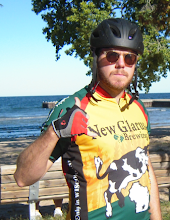
We now interrupt your regularly scheduled Portugal programming. There are a few more days from the 'Week in Portugal' series yet to go and, believe me, they're on their way. If anyone reading needs instant Portugal trip recap gratification, here is a public link to one of my many photo albums on the Facebook. Should keep you busy for a while.
In the meantime, however, I just wanted to wax ever so slightly philosophical. This morning I went for a long run (1 hour is pretty long for me) into the large, grassy park just on the outskirts of Den Bosch called Het Bossche Broek. I've walked and run around parts of it several times, though my typical, shorter route just takes me around have of Den Bosch itself. But that's not important. Since I had decided it would be a longer run and I didn't have anything for which I needed to be back home at a certain time, I decided to follow some paths I hadn't been down before and explore a little more of the 'broek' (which actually means 'pants' in Dutch, but apparently has a different usage here).
Most of the paths crisscrossing the Broek are paved, though a few aren't - and seem like they may be less traveled by common recreationers because they more provide access to the grazing areas for cows and sheep than easy, flat, traversing. As I got to the back of the Broek (as it approached a major roadway on one side), I saw what definitely looked like just a service road of trampled grass leading straight into some trees. I kept on the paved path, even though I hadn't been on either before, and at the moment it reminded me of how basically every canned graduation speech I've ever heard has somehow referenced Robert Frost's 'The Road Not Taken'. More than almost any other time of the year, graduation time just gets me reflective.
What interests me, I guess, is what graduates are really supposed to get (and are actually applying) from that poem. Right, right, we all know the closing: 'I took the one less traveled by,/ And that has made all the difference.' What I remember from speeches is kids saying that this is a metaphor for not just taking the easy way out, that once we graduate from whatever institution we happen to be sitting in the large athletic arena of, the 'next stage' of life isn't going to be easy and so, rather than just sit on our laurels and coast through this 'next stage' like, presumably, every one else, we should go for the less common approach of digging in, grinding our noses and not slacking off ever, and ultimately we'll feel better about that course of action.
But it doesn't seem like just plain working hard to get ahead is so uncommon anymore. In fact, I can't say I know too many people in my generation I'd characterize as slack-offs or bums. Going somewhere is the norm. Don't get me wrong, I don't think people should stop going to grad school in droves or stop trying to rocket up their corporate ladders, continually striving to develop 'marketable skills'. I absolutely admire the sheer drive, motivation and execution I see in so many of my peers.
Maybe the message from Frost for grads of the moment is about taking risks. Entering a new phase of life is never without built-in risks. You can choose to venture after them or shy away and do something that seems more familiar. I certainly can't say that folks who go the law school route or the TFA route aren't taking risks. Those roads carry huge risks, not the least of which for the former are the risks of loss of sanity and financial independence, at least according to law school friends. But none of them has said law school wasn't worth it; quite the opposite.
I don't recall any outgoing seniors drawing this conclusion, but maybe Frost is saying that it's ok, actually commendable, to do something completely bat-shit crazy as you traverse, something people rarely do - really rock the boat or create something unique out of your action that's characterized by premeditated abandon ('I doubted if I should ever come back'). Because, like I said, forward progress to gainful employment and higher-higher education is much more the norm than it is 'less traveled' and certainly not 'not taken'. Not that there's anything wrong with that: I am DEFINITELY NOT taking a shot at anyone that may fit into one of the categories I've mentioned; NOR am I trying to indirectly boast that I think my decision to quit my job, move to Europe to follow my girlfriend and try my luck in a completely different career field is any better life choice to make or closer adherence to any of the interpretations of what we've so often made out to be an encouragement from Mr. Frost than anything my peers have done.
Maybe, Frost's poem just isn't cut out for a graduation speech. Maybe, there just aren't that many 'not taken' roads that lead to what most people set out to achieve when they graduate: financial, vocational, spiritual, domestic success - in a word, happiness.
I'm curious if anyone out there has any other thoughts about Frost's poem and how it relates to graduation, where folks go and what they do afterwards, and if Frost is actually trying to give advice, how should we follow it?






